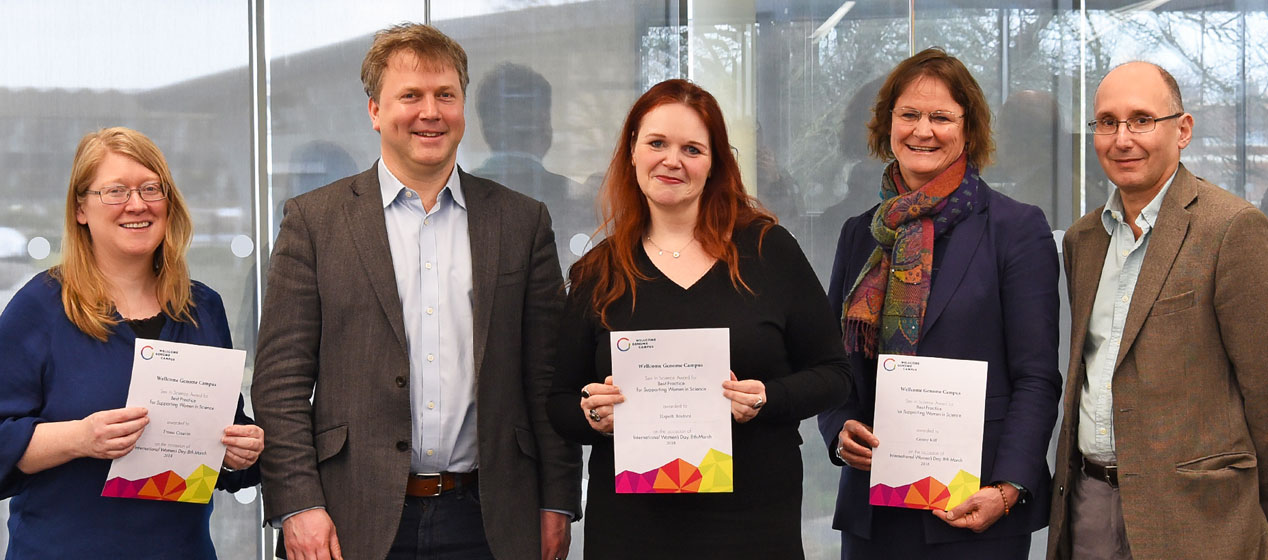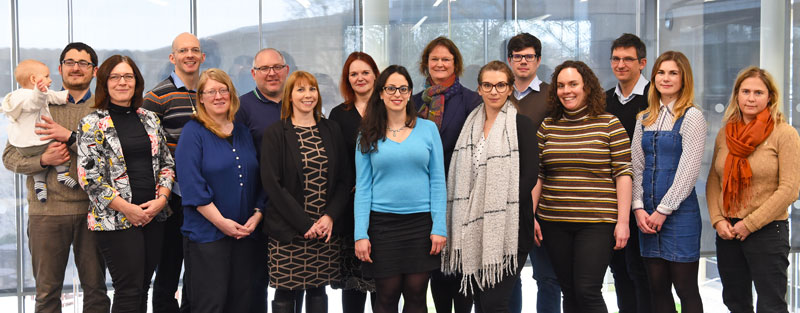Supporters of women in science shine

On International Women’s Day (8 March) the Wellcome Genome Campus celebrates members of staff who lead the way in supporting women in science with the presentation of the Sex in Science Best Practice Awards. Congratulations to the winners of the fourth annual awards: Elspeth Bruford from EMBL-EBI, Genny Kiff of the Wellcome Sanger Institute and Treasa Creavin from Connecting Science’s Advanced Courses and Scientific Conferences.
Elspeth Bruford, Co-ordinator of HUGO Gene Nomenclature Committee at EMBL-EBI was nominated for a Best Practice Award by multiple team members, who expressed personal stories of how Elspeth had supported women in her team over the years and nurtured their talent at all stages of their careers. Elspeth has had a great, positive influence on her team, from supporting staff through multiple maternity leaves, assisting with part-time working and providing help for women to stay in their role when they might have otherwise left science.
“I was very touched that my team thought of nominating me. I guess it showed me that I’ve been doing something right. As a team leader, you have to understand that everyone’s family circumstances are different, so you have to be flexible to the needs of your team if you want them to be happy. People work best when they’re happy so you should do whatever you can to accommodate their needs. It may take more time, but it will definitely be worth it.”
Elspeth Bruford Co-ordinator of HUGO Gene Nomenclature Committee at EMBL-EBI
Chief Financial Officer at the Wellcome Sanger Institute, Genny Kiff was nominated for a Best Practice award for her no-nonsense approach and strong support of the Equality, Diversity and Inclusion programme of work. Genny is seen as an inspirational role model for other staff at the Sanger Institute, and has been described as a ‘catalyst for change’.
“The award was unexpected and I am very honoured to receive it. I feel it is a testament to all of the people in Finance, Procurement, Grants and Stores who have embraced and led change in a collaborative manner to improve the way we support research on Campus. When directing this change, one of the leaders I was inspired by was Sheryl Sandburg, the COO of Facebook. I particularly like one of her quotes, ‘in future there will be no female leaders. There will just be leaders’. With the help of the Equality, Diversity and Inclusion team, we can make this happen.”
Genny Kiff Chief Financial Officer at the Wellcome Sanger Institute
Treasa Creavin, Scientific Programme Manager at Connecting Science has had an instrumental role in developing and implementing the Advanced Courses and Scientific Conferences Gender Balance policy. Her work on increasing the percentage of female speakers at conferences in the 2018 conference programme from 30 per cent to 50 per cent led to her nomination for a Best Practice Award. Treasa was also behind the new Carer Bursaries scheme, which supports delegates with caring responsibilities, enabling them to attend events and further their careers.
“It is a great honour to receive this award. Since implementing our gender balanced policy over the past year, we have seen a significant increase in the number of female speakers at our conferences. This has been crucial in helping to increase the visibility of female scientists across several different biomedical fields in our programme, and I hope efforts such as ours will lead to a change in the wider research culture. Thanks to the ACSC team and our scientific programme committees for helping to make our conferences more equitable.”
Treasa Creavin Scientific Programme Manager for Advanced Courses and Scientific Conferences, Connecting Science
In the run up to the Best Practice Awards, all staff working at the Wellcome Genome Campus were invited to nominate a colleague who had made a positive difference to women’s careers.
Nominees included: Chris Dooley, Claire O’Donovan, Daniel Suveges, Ele Zeggini, Evangelia Petsalaki, Fran Gale, Helen Savage, Inês Barroso, Julia Wilson, Ludovic Vallier, Mark Green, Martin Hemberg, Maya Ghoussaini, Nicole Soranzo, Paris Litterick, Rob Finn, Sandra Orchard, Sarah Sims, Sarah Teichmann, Simon Clare, Sue Lee and Yali Xue.
“Each year we celebrate the role models on campus who create an environment where staff and students from all backgrounds can thrive. Employing the brightest minds is vital to the endeavour of research, and providing a supportive place to work is pivotal in achieving that.”
Professor Sir Mike Stratton Director of the Wellcome Sanger Institute and CEO of the Wellcome Genome Campus
“It’s encouraging to see the Best Practice Awards becoming an established initiative on the Wellcome Genome Campus. This year we have had a wider range of nominees than ever before, many of which go beyond good management practice. We’re hoping this year’s winners will inspire new success stories and further strengthen the collaborative culture on campus.”
Dr Ewan Birney Director of EMBL-EBI
Recognition of role models who support women in science is just one activity of the Wellcome Genome Campus Sex in Science programme. Over the last year, members of the Sex in Science team have been busy in broadening their scope of work beyond gender, and have established the Equality, Diversity and Inclusion programme of work.
Other highlights have included addressing the gender pay gap for women at senior levels by making the pay grade more transparent and uplifting salaries, offering unconscious bias workshops and talks for all staff to ensure at least one recruitment panel member will have undergone unconscious bias awareness training prior to interviews, and implementing ‘paid leave for carers’, which allows staff to take up to ten days paid leave per year to manage extraordinary caring responsibilities.

More information
Selected websites
The Sex in Science Programme
The Sex in Science programme is a joint initiative of the Wellcome Trust Sanger Institute and the EMBL-European Bioinformatics Institute (EBI) that aims to generate discussion and raise awareness about issues traditionally facing women in science, and to drive policy and practice changes to redress them. The Sanger Institute was one of the first research institutes to receive an Athena SWAN Bronze Award.
The European Bioinformatics Institute (EMBL-EBI)
The European Bioinformatics Institute (EMBL-EBI) is a global leader in the storage, analysis and dissemination of large biological datasets. We help scientists realise the potential of ‘big data’ by enhancing their ability to exploit complex information to make discoveries that benefit humankind. We are at the forefront of computational biology research, with work spanning sequence analysis methods, multi-dimensional statistical analysis and data-driven biological discovery, from plant biology to mammalian development and disease. We are part of EMBL and are located on the Wellcome Genome Campus, one of the world’s largest concentrations of scientific and technical expertise in genomics. Website: www.ebi.ac.uk
Wellcome Sanger Institute
The Wellcome Sanger Institute is one of the world’s leading genome centres. Through its ability to conduct research at scale, it is able to engage in bold and long-term exploratory projects that are designed to influence and empower medical science globally. Institute research findings, generated through its own research programmes and through its leading role in international consortia, are being used to develop new diagnostics and treatments for human disease. To celebrate its 25th year in 2018, the Institute is sequencing 25 new genomes of species in the UK. Find out more at www.sanger.ac.uk or follow @sangerinstitute
About Wellcome Genome Campus Connecting Science
Wellcome Genome Campus Connecting Science’s mission is to enable everyone to explore genomic science and its impact on research, health and society. We connect researchers, health professionals and the wider public, creating opportunities and spaces to explore genomic science and its impact on people. Connecting Science inspires new thinking, sparks conversation, supports learning and measures attitudes, drawing on the ground-breaking research taking place on the Wellcome Genome Campus. https://connectingscience.wellcomegenomecampus.org/
Wellcome
Wellcome exists to improve health for everyone by helping great ideas to thrive. We’re a global charitable foundation, both politically and financially independent. We support scientists and researchers, take on big problems, fuel imaginations and spark debate. wellcome.org


